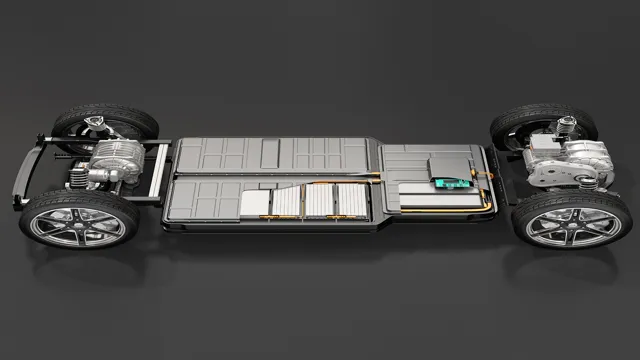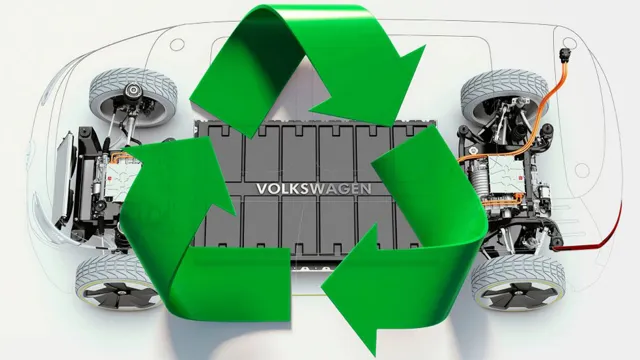Exploding Myths: Debunking the Truth About Electric Car Battery Explosions
Electric cars have been revolutionizing the automobile industry due to their eco-friendly nature and the desire to reduce carbon emissions. However, one concern that pops up whenever a new and relatively unknown technology is introduced is the question of safety. Electric car batteries have been under intense scrutiny, with many people questioning whether they are prone to explosions.
In this blog post, we’re going to explore the topic of electric car batteries exploding and provide an in-depth analysis of why this fear exists, whether it’s valid, and what the future of electric car technology holds.
Understanding Electric Car Batteries
The topic of electric car batteries and their potential to explode can often cause concern for drivers. However, it’s important to note that the chance of an electric car battery exploding is extremely low. In fact, electric car batteries are designed with safety features such as cooling systems and protective casings to prevent any dangerous situations.
Additionally, electric car manufacturers conduct rigorous testing to ensure the safety and reliability of their batteries. It’s important to remember that electric cars go through thorough safety inspections before hitting the market. In short, the risk of electric car batteries exploding is minimal as safety measures are put in place to prevent such incidents.
How Electric Car Batteries Work
Electric Car Batteries Electric car batteries are at the heart of any electric vehicle. They are the source of energy that powers the electric motor and allows the car to drive without using gasoline. Unlike traditional car batteries, electric car batteries are large, complex and much more powerful.
They are designed to store a lot of energy, which is needed to propel the car for longer distances. Electric car batteries work by using a chemical reaction between different materials, typically lithium and a metal oxide. This creates an electrical charge that is stored in the battery cells.
When the car is in motion, the electric motor draws the energy from the battery, which is then used to turn the wheels. The battery will eventually run out of energy, but can be recharged using external power sources, such as charging stations or a home plug. Electric car batteries are designed to be highly efficient, reliable, and long-lasting.
They are also constantly evolving, with new technologies being developed all the time to improve their performance and reduce their cost. Overall, understanding how electric car batteries work is essential for anyone interested in owning an electric vehicle or working in the automotive industry. With more electric vehicles hitting the road every year, electric car batteries are set to play a major role in the future of transportation.

Types of Electric Car Batteries
Electric car batteries come in different sizes, shapes, and types. Understanding the types of electric car batteries is crucial as it determines the range, cost, and performance of the electric vehicle. There are three main types of electric car batteries: lithium-ion, nickel-metal hydride, and lead-acid.
The most common battery used in electric vehicles is the lithium-ion battery. This type of battery is efficient and has a high energy density, which means it can store more energy in a smaller amount of space. Nickel-metal hydride batteries are also used in some electric cars, but they are less efficient and have a lower energy density than lithium-ion batteries.
Lead-acid batteries are more commonly used in hybrid vehicles and are less efficient than the other two types of batteries. Whichever type of electric car battery is used, it’s important to note that regular maintenance and proper care can extend the life of the battery and improve its performance.
Safety of Electric Car Batteries
As with any vehicle, safety is of utmost importance when it comes to electric cars. One concern that many people have is whether or not electric car batteries can explode. While the possibility of this happening is not impossible, it is incredibly rare.
In fact, there have been very few reported incidents of electric car battery explosions, and those that have occurred were typically the result of faulty charging equipment or other external factors. Manufacturers go to great lengths to ensure the safety of their electric car batteries through rigorous testing and design practices. Additionally, many electric cars have advanced safety features that can help prevent accidents and protect occupants in the event of a collision.
Ultimately, while electric car batteries do have the potential to explode, the likelihood of this happening is low, and the benefits of electric cars far outweigh the risks.
Risk of Explosion Compared to Gasoline Cars
Electric car batteries are often subject to scrutiny due to their potential risks. However, studies have shown that electric cars have a much lower risk of explosion than gasoline cars. In fact, the risk of explosion in electric cars is incredibly rare, with most incidents being caused by external factors such as collisions or faulty charging equipment.
This is because electric car batteries are designed to be extremely durable and are made with materials that are less volatile than the flammable liquids used in gasoline cars. Additionally, electric cars have a wide range of safety features that prevent accidents and mitigate the risk of explosion. These safety features include features such as automatic emergency braking, lane departure warnings, and blind-spot monitoring.
Thus, even though the risk of explosion from electric car batteries exists, it is considerably lower than that of gasoline cars.
Safety Features Built into Electric Car Batteries
The safety of electric car batteries is a top priority for manufacturers and engineers, and there are numerous safety features built into these battery systems to ensure they are as safe as possible. One of the primary safety features is a thermal management system, which helps regulate the temperature of the battery cells. This is critical because lithium-ion batteries can become very hot if they are charged or discharged too quickly, which can lead to a fire or explosion.
In addition, most electric car batteries have multiple layers of protection to prevent short circuits and overcharging, which can also cause serious safety issues. These safety features are constantly being improved and updated with new technology, making electric vehicles even safer for consumers to drive. So, if you are considering buying an electric car, you can rest assured that the battery is designed with numerous safety features to keep you protected on the road.
Real-World Examples of Electric Car Battery Safety
The safety of electric car batteries is a topic of concern for many potential buyers. However, real-world examples have shown that these batteries can be incredibly safe. For instance, Tesla’s Model S has been in several high-speed accidents, and in all cases, the battery pack remained intact without catching fire.
Additionally, when an electric car does catch fire, it behaves differently than a gasoline-fueled car. Gasoline fires can spread quickly and violently, but electric car batteries burn slowly and are easier to contain. That being said, it’s important to note that electric car battery safety is heavily regulated by organizations such as the National Highway Traffic Safety Administration, which sets standards for crash safety and fire prevention.
Ultimately, while electric car batteries may seem intimidating, they have proven themselves to be just as safe, if not safer, than their gasoline counterparts.
Steps to Prevent Electric Car Battery Explosions
As electric cars become more popular, one of the most common concerns among potential buyers is whether or not electric car batteries can explode. While it is possible for electric car batteries to explode, there are several steps that can be taken to prevent this from happening. First and foremost, it is important to ensure that the battery is well-maintained and kept at an appropriate temperature.
This means avoiding extreme temperatures and keeping the battery within its recommended temperature range. Additionally, it is important to use only high-quality charging equipment and to avoid overcharging the battery. Finally, it is essential to follow basic safety guidelines, such as avoiding damage to the battery and keeping it away from flammable materials.
Overall, while electric car batteries can potentially explode, taking proper precautions can greatly reduce the risk of this happening.
Proper Handling and Maintenance of Batteries
Electric car batteries are incredible pieces of technology that provide a lot of power, but they can be dangerous if not properly cared for. Battery explosions can happen, but there are steps you can take to prevent them. First, make sure your battery is regularly maintained and inspected.
Check for any signs of damage or leaks, and be sure to replace your battery if necessary. Additionally, make sure your battery is properly installed and secured in your car. This helps prevent any movement or vibrations that could damage the battery.
Finally, always be cautious when charging your battery. Use a charging cable that’s designed for your specific battery, and make sure to follow all of the manufacturer’s instructions for charging. By taking these simple steps, you can help ensure that your electric car battery stays safe and reliable for years to come.
Avoiding Overcharging and Overheating
Electric car battery explosions are a major concern for many drivers, but there are steps you can take to prevent them from happening. One of the most important things to keep in mind is to avoid overcharging your electric car battery. This can lead to overheating, which in turn can cause the battery to explode.
To prevent this, make sure you only charge your battery to the recommended level and avoid leaving it plugged in for extended periods of time. Additionally, it’s important to keep your battery cool, especially in hot weather. Parking in the shade or in a cool area can help prevent overheating and reduce the risk of explosions.
By following these simple steps, you can help ensure that your electric car battery stays safe and avoids any potential hazards.
Conclusion: Electric Car Batteries are Safe
In conclusion, the idea that electric car batteries are prone to explode is simply a matter of misconception and sensationalism. While any type of battery can experience a malfunction or failure, modern electric car batteries are engineered with stringent safety standards and undergo rigorous testing to ensure their reliability. So, let’s put this myth to rest and embrace the future of sustainable transportation without fear of fiery explosions.
“
FAQs
Can electric car batteries explode?
Yes, there is a rare possibility of electric car batteries exploding in case of a severe impact or high temperatures. However, manufacturers take precautions to prevent such incidents.
How do electric car batteries prevent explosions?
Electric car batteries have several safety measures, such as thermal management systems, pressure relief valves, and reinforced body structures, to prevent explosions and ensure passenger safety.
How often do electric car batteries need to be replaced?
Electric car batteries have a lifespan of 8-10 years, and their replacement frequency depends on the usage, charging habits, and environmental factors. Some manufacturers offer a battery warranty for a certain period.
Can electric car batteries be recycled?
Yes, electric car batteries can be recycled, and they contain valuable metals like cobalt, lithium, and nickel, which can be reused. Recycling also reduces the environmental impact of battery disposal.





